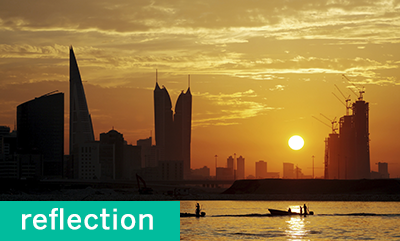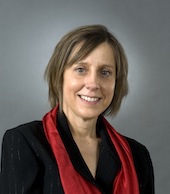Reflection: Human Rights and Relationships.
 I had participated in human rights investigations in countries around the world, but this was my first trip to an Arab country. I knew certain customs, like not offering my hand to those of the opposite sex unless they offered first, and was also conscious of the fact that I would be traveling during the holy month of Ramadan. Still, I was a little apprehensive that my dress or mannerisms would be off.
I had participated in human rights investigations in countries around the world, but this was my first trip to an Arab country. I knew certain customs, like not offering my hand to those of the opposite sex unless they offered first, and was also conscious of the fact that I would be traveling during the holy month of Ramadan. Still, I was a little apprehensive that my dress or mannerisms would be off.
But the people of Bahrain were warm and welcoming, the hospitality was exquisite, and my apprehension quickly dissipated. My colleague and I were greeted as soon as we stepped off the plane, escorted to a gold and marble room where we drank tea while our hosts took our passports and completed customs formalities. We were then taken to our hotel after the 14-hour flight to combat jet lag before our very grisly work was to begin.
I perform forensic medical examinations, an interest kindled by caring for refugee patients in my clinical practice, many of whom are seeking political asylum from torture in their home countries. This interest has developed into an expertise, and I have testified in hundreds of court cases. Eventually, I co-founded the Forensic Medical Evaluation Group at Boston Medical Center, and work with Global Lawyers and Physicians at the School of Public Health on torture prevention measures.
Our job in Bahrain was to perform independent forensic medical evaluations as part of an investigation into alleged human rights abuses occurring during the Arab Spring. The task at hand was intense. We evaluated dozens of victims and prisoners in rapid succession, in a foreign environment and language. I was aware there was likely no privacy with our meetings. I bore witness to profound human suffering. All of the men described torture and other cruel, inhuman, and degrading treatments, and their stories were painfully palpable. The physical evidence was grotesque in some of the cases. The challenge for me in this situation was to make a human connection by offering empathy and understanding and developing trust while collecting deeply painful and personal facts and data about men I would only meet once—as a female, in a foreign culture, all in the matter of one to two hours. It was a daunting task.
I met and evaluated one particular doctor who was arrested and tortured along with a group of medics who had been detained. I learned we had much in common (including the ages of our children), and there was an amorphous connection that went beyond the immediate task at hand. Perhaps the situation was just too close to home. My mind did not let go of this doctor and his family, even after I left Bahrain. I was thrilled when I learned later that my forensic report had been helpful in gaining his release from prison. I remembered our initial meeting as if it was yesterday.
Two years later, I unexpectedly met him and his wife in Istanbul at a human rights training. I was struck and inspired by their resilience, recovery, and continued commitment to human rights after so much personal suffering. This family was a powerful reminder of the strength and capacity of the human spirit to heal, no matter the challenge. In Istanbul, I felt as if we were old friends. Our shared passion to promote human rights had impacted us and our life trajectories in very different yet very similar ways, until we found ourselves reconnecting as colleagues. At the end of our time together, he gave me a special ring as a gesture of friendship.
Even though much time passed without communication, I was warmed but not surprised to hear from this doctor several months ago. I somehow knew we would meet again. He contacted me when he and his wife were in Boston delivering their freshman son to Boston University, the same school where my daughter was also starting as a college freshman. I reflected on the journey we had traversed: starting with a shared love of medicine and family, and a passion for human rights, to forensic doctor and torture victim, then to friends, colleagues, and as now as parents experiencing the milestone of their children starting college in Boston.
As we ate pastries and drank coffee at a small restaurant in Cambridge, we talked about freshman orientation week as nervous parents. We shared the same concerns and anxieties as all parents do during this time. Would our children be happy? Would they eat properly and get enough exercise? We were both grateful for the “apps” that permit instant communication, whether down the street at the Medical Campus in my case, or across the world in Bahrain in his.
Our friendship has transcended torture, continents, countries, religion, politics, language, and culture, and now a shared journey at BU with our children—a rich tapestry indeed. I asked him about the ring he had given me two years ago—which I continued to wear as a source of inspiration—and this was his response:
“Regarding the ring, it’s a special silver ring with special stone called onyx which is engraved with the holy mosque in Mecca. It was gifted to me on 1992, and I wore it till 2013. I visited several holy places wearing it, and I did my daily prayers wearing it. I believe that this brought me a lot of luck and protected me. When I was arrested in 2011, it was taken from me, and I thought I will never get it back like other stuff stolen from me. Upon my release, it was the only thing that was given back to me. I was planning to keep wearing it till the last day of my life and have it buried with me.
“When I met you, the precious lady who helped me and saved me from a harsh prison sentence by writing the most valuable medical report after three years from our first meeting in prison, I thought of giving her this ring as a means of saying thank you, hoping it will bring her luck and protect her.”
In this world, there are beautiful moments to be captured. Sharing coffee with this man and his family on a vividly brilliant Boston morning is one of those to be cherished. Human rights stories cannot all end happily. But here we were—sharing smiles and laughter, and a determination to advance human rights to try to make the world a better place for all of us to live.
 Sondra Crosby is an associate professor at the Schools of Medicine and Public Health and director of the Immigrant and Refugee Health Program at Boston Medical Center. She served as a medical consultant to the Bahrain Independent Commission of Inquiry (BICI) to review evidence of torture.
Sondra Crosby is an associate professor at the Schools of Medicine and Public Health and director of the Immigrant and Refugee Health Program at Boston Medical Center. She served as a medical consultant to the Bahrain Independent Commission of Inquiry (BICI) to review evidence of torture.